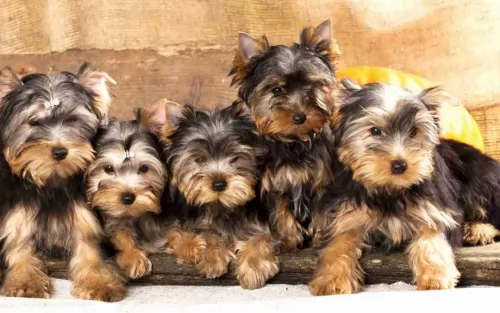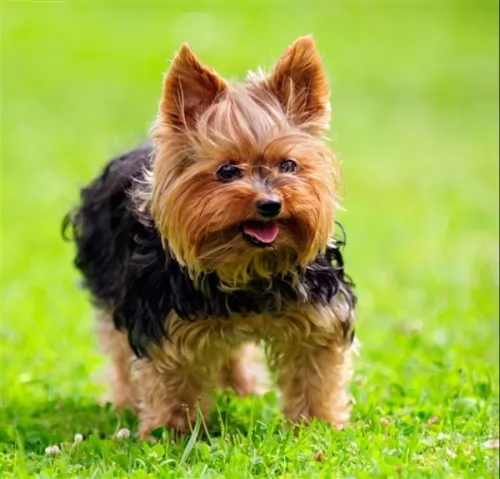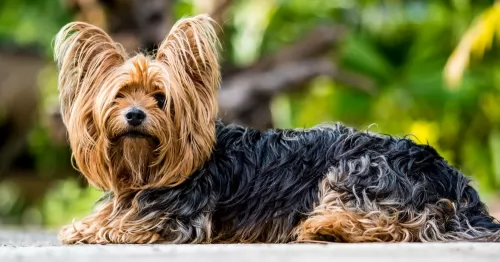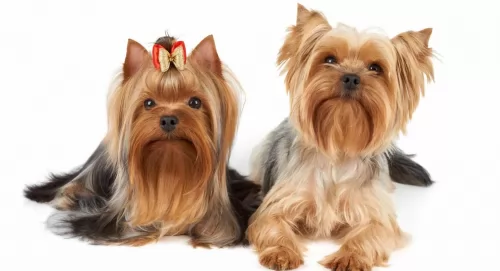 Petzlover
Petzlover Yorkshire Terrier is originated from United Kingdom but Kars Dog is originated from Turkey. Yorkshire Terrier may grow 67 cm / 26 inches shorter than Kars Dog. Yorkshire Terrier may weigh 77 kg / 169 pounds lesser than Kars Dog. Yorkshire Terrier may live 3 years more than Kars Dog. Yorkshire Terrier may have less litter size than Kars Dog. Yorkshire Terrier requires High Maintenance. But Kars Dog requires Moderate Maintenance
Yorkshire Terrier is originated from United Kingdom but Kars Dog is originated from Turkey. Yorkshire Terrier may grow 67 cm / 26 inches shorter than Kars Dog. Yorkshire Terrier may weigh 77 kg / 169 pounds lesser than Kars Dog. Yorkshire Terrier may live 3 years more than Kars Dog. Yorkshire Terrier may have less litter size than Kars Dog. Yorkshire Terrier requires High Maintenance. But Kars Dog requires Moderate Maintenance
 The Yorkshire terrier originated in Yorkshire which is a place in northern England. In mid 19th century workers from Scotland came to Yorkshire in search for work. They brought different varieties of small terriers with them. Earlier they are known as Broken Haired Scotch Terrier and then Toy Terrier. In 1874 they were officially named as Yorkshire Terrier. They begun their journey as hunting dogs and later developed as companion dogs. AKC registered the breed in 1878.
The Yorkshire terrier originated in Yorkshire which is a place in northern England. In mid 19th century workers from Scotland came to Yorkshire in search for work. They brought different varieties of small terriers with them. Earlier they are known as Broken Haired Scotch Terrier and then Toy Terrier. In 1874 they were officially named as Yorkshire Terrier. They begun their journey as hunting dogs and later developed as companion dogs. AKC registered the breed in 1878.
 The Kars Dog is found in Turkey, hailing more specifically from the Kars province, after which it is named. He actually has a long history of at least 600 years.
The Kars Dog is found in Turkey, hailing more specifically from the Kars province, after which it is named. He actually has a long history of at least 600 years.
Referred to as a Molosser, the dog is still used to this day for shepherding livestock. There are many varieties and sizes of the dog, with the most common Kars type being similar to the Nagazi variant of the Caucasian Shepherd Dog.
 Yorkshire terriers are one of the glamorous member of the dog breeds. They have excellent personality as their owner will be surely proud of them when taking them in public. They like to go outside and make adventures. They are good companion dogs and watch dogs too. They are very affectionate with their owners. Yorkies always bark when any stranger comes and they should be taught about neighbours and when to bark. They will get angry on seeing new dogs and surely chases squirrels.
Yorkshire terriers are one of the glamorous member of the dog breeds. They have excellent personality as their owner will be surely proud of them when taking them in public. They like to go outside and make adventures. They are good companion dogs and watch dogs too. They are very affectionate with their owners. Yorkies always bark when any stranger comes and they should be taught about neighbours and when to bark. They will get angry on seeing new dogs and surely chases squirrels.
They like to spend more time with their people. Leaving them alone for long time is not good. Yorkshire terrier should be treated gently and with love. They love to spend time with older children. They love apartment life if they are made to play and walk daily. Yorkies are the second most popular dog in America.
 Large and heavy, the Kars Dog is strong, with a large head and broad chest. The height of the dog at the withers is 60 to 90cm and he weighs in at roughly 60 - 80kg.
Large and heavy, the Kars Dog is strong, with a large head and broad chest. The height of the dog at the withers is 60 to 90cm and he weighs in at roughly 60 - 80kg.
At one time the ears were cropped but they are left these days and then they are of medium length and floppy. The coat varies too in terms of length and color - short to longer variety coats. The coat can be a solid color or it can have patterns. You’ll find reddish brown dogs, grey and black dogs as well as dogs with a mix of colors.
The Kars is an aggressive, territorial dog, but with the correct training, socialization and upbringing, it can be a loving, amicable family pet.
Known also as the Kars Turkish Shepherd or Kars shepherd, he makes an ideal guarding dog as he is brave and devoted to those he is protecting. He is cautious and even unfriendly towards people he doesn’t know, and it is thought that because of his robustness, it might not be a good idea to leave him unsupervised with small children.
Nonetheless with training and socialization, the Kars is capable of being a super pet for all members of the family. Training him won’t be that easy as he is large and strong-willed, but the training will provide him with some basic good manners.
He will require a firm, confident owner and will require living in a home with a big garden or in the countryside as he requires a good amount of exercise.
 Yorkshire terrier are not so much friendly with children. It is not advised to leave them with children without adult supervision.
Yorkshire terrier are not so much friendly with children. It is not advised to leave them with children without adult supervision.
They were previously used to catch rats and hunt badger and fox. They are excellent watchdogs and defend their territory very well.
They adapts well for apartment living. But they will not be happy if leaved alone for a long time. Yorkies cannot tolerate too hot or cold weather.
They are moderately easy to train. Yorkshire terrier should be trained early when they are amenable to process. Sessions should be conducted with lots of treats and must be short as they will easily get bored.
 The Kars is a large dog and because of his past where he used to guard livestock, he is a dog used to wide open spaces. He will require a home with a good sized garden and a family who exercises him frequently.
The Kars is a large dog and because of his past where he used to guard livestock, he is a dog used to wide open spaces. He will require a home with a good sized garden and a family who exercises him frequently.
With the right kind of care, the Kars is able to strongly bond with his human family, taking his role as guardian and protector very well. He is alert and smart and that is why he will need training and socialization and a firm, fair human owner. He will then become a loving, devoted companion.
 The Kars is generally healthy and long-lived, being able to reach 12 years of age with ease if cared for properly. Every dog, even the most healthiest ones, will have some health issues, and with a large dog like this, it is hip dysplasia, obesity, cancer and heart problems.
The Kars is generally healthy and long-lived, being able to reach 12 years of age with ease if cared for properly. Every dog, even the most healthiest ones, will have some health issues, and with a large dog like this, it is hip dysplasia, obesity, cancer and heart problems.
Coughing is a symptom of different illnesses, with one of them being heart disease. If your dog is still coughing after several days, its time to see the vet.
When your dog hasn’t exercised, you’ll see him battling to breathe or the breathing will be rapid. He’ll be reluctant to walk and play too and may be disinterested in his food. Edema, the swelling of body tissues is also a sign of heart disease.
 For English bull dog puppies, When you change the puppy food from liquid to solid initially you must give what the dam is having. This is to avoid digestive problems when new food is introduced. The level of liquid food should be reduced in a step by step manner and thus increasing solid food gradually.
For English bull dog puppies, When you change the puppy food from liquid to solid initially you must give what the dam is having. This is to avoid digestive problems when new food is introduced. The level of liquid food should be reduced in a step by step manner and thus increasing solid food gradually.
You have two choices and one is manufactured dog food and another is home cooked food. Commercial brands are not suggested as they contain artificial coloring and chemical preservatives.
Vaccinations should be made at the right time. The food given should be the best.
Yorkshire terrier should be taught tricks by giving rewards. Exercising them has benefits such as maintaining muscles, release pent-up energy, good for heart, good metabolism, good sleep and be active.
 Your Kars dog can be a wonderful addition to your home, but you need to know how to care for a big dog before you get carried away and add a large puppy breed to your family.
Your Kars dog can be a wonderful addition to your home, but you need to know how to care for a big dog before you get carried away and add a large puppy breed to your family.
Too many people buy a cute bundle of fur and get rid of it when he is no longer a cute puppy. Before you bring a giant breed dog into your home, take note of some useful tips to keep him in tip top condition -
If you bring a puppy home, he’ll need to be fed 4 times a day with special puppy food. There are excellent commercially manufactured puppy foods on the market and you will need to get the one that caters for ‘large- or giant puppy breeds’, as the Kars is a very big dog.
As your dog reaches adulthood you’ll feed him less. If in any doubt as to the kind of food to give your dog to maintain good health, speak to your vet.
Every dog will need exercise to keep him trim and fit but to also stimulate their minds. Providing your Kars dog with exercise such as walks and ball games will also ensure he doesn’t become bored.
Your pet will need a nice quiet, warm, dry place to sleep and rest. If he is an outdoor dog during the day, make sure that he has a place to rest in the shade. Make sure he has a non-stop supply of fresh, cool water too that is placed in a cool, reachable spot.
Your large pet is an average shedder and to keep his thick coat in tip top condition, you want to be sure to brush him at least twice a week.